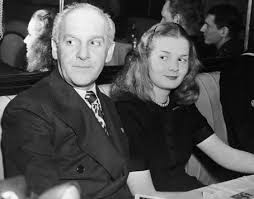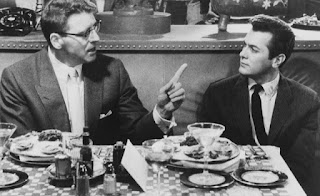What
is it like to witness one of history’s most lurid practitioners of
below-the-belt gossip-mongering getting served with the same treatment?
Like
Walter Winchell, the target of our book, this 1953 hit job is brassy, bitchy,
and hard to put down. Once you do, alas, it’s easy to forget.
“Nothing is so terrible as ignorance with spurs on,” is a quote by one of many Winchell detractors who gets a turn in this gripe-fed exposé, originally a series of magazine articles before author Lyle Stuart repackaged and self-published the material in book form after winning a libel suit against Winchell, who had labeled him a “rat” in his column.
A one-time vaudeville dancer, Winchell became a newspaper and radio star telling tales on the rich and famous. At his peak, in the late 1940s, his writing was syndicated across some 2,000 newspapers worldwide, and his radio program the most-listened-to 15 minutes in the country. But the rise of television and Winchell’s public embrace of McCarthyism were by the time of this book causing his star to droop.
In
a short preface, Stuart claims a recent mugging by three assailants near his
home in North Bergen, New Jersey. Not spelling it out, Stuart leaves the
inference of Winchell’s involvement in the attack clear. Later in the book, he
claims a newsstand distributor refused to retail his magazines in an attempt to
curry Winchell’s favor.
Let’s
cut to the chase. Stuart’s Winchell is one bad guy:
He
has always used his column the way his gangster friends used their blackjacks
or guns. The column was Winchell’s gun, and where some guns had silencers,
Winchell’s column had none. Nor did it have scruples, decency or conscience.
Stuart’s
book is not much read today, but according to Bob Thomas’s Winchell, it
played a role, not major but significant, in turning public opinion against the
man who personified the press to millions over two decades. Let other writers
speak of Winchell’s glories; The Secret Life Of Walter Winchell reveals
a hypocrite, liar, defamer, gangster toady, tool of extremists both left and
right, and a jealously possessive father.
Winchell
shrugs off his only sibling while ignoring his mother to the point of her committing
suicide. Stuart claims her Jewish accent embarrassed him.
 |
| Winchell's column as it appeared in the New York Daily Mirror in the 1930s. Image from http://www.davidbordwell.net/blog/2017/01/16/my-girl-friday-and-his-and-yours/. |
See
him as they saw him then.
He
has become a man about town. He is so proud of his current mistress that he
takes her everywhere, pawing her in public, kissing her cheeks, her fingers.
The
embarrassment is so great to June Winchell that she locks him out of their
apartment. He rents a suit in a hotel room and cuts off her income.
“Do
you want your daughters to starve?” she says.
When
it came to the Red Scare, Stuart claims Winchell was cleverly used by American
communists who wanted him to go after “their arch-enemies, the liberals,”
feeding Winchell “make-believe items” he trotted out in his columns to that
end. Winchell was similarly used by anti-communist Sen. Joseph McCarthy, making
him a stooge in both directions.
Stuart
himself is a fine one to have at Winchell the social leper. His own career came
from courting and publishing controversy, including a book showing how to build
a bomb (The Anarchist Cookbook) and another which wound up encouraging
Timothy McVeigh to use one in Oklahoma City (The Turner Diaries). If anyone
exploited the First Amendment more vilely than Winchell, it would have been
Stuart.
In
The Secret Life Of Walter Winchell, Stuart manages quite a front as one
who is shocked, shocked, to find scurrilous journalism going on.
Winchell,
he claims, is read by more people daily “than have read Shakespeare throughout
the centuries.” What they were reading is a combination of bad poetry, baseless
rumor, and wild fallacy. According to one 1940 check of five monthly columns,
“far fewer than fifty percent of Winchell’s items were accurate.”
“No
other performer has ever done so well with so little,” Stuart quotes Collier’s
magazine observing.
The
worse Winchell’s lies, Stuart writes, the more the public ate it up, at least throughout
the 1930s and 1940s, his years at the top:
Winchell
has always been beneficiary of fortunate circumstance in that for
self-protective reasons, newspapers have been very reluctant about publicizing
libel suits or the grounds for libel. The result is that only one person out of
a thousand who could sue Winchell knows enough about his rights to even
consider suing Winchell.
In
excerpts like that one Stuart’s writing is less the product of careful research
than a vivid imagination. The quotes he manages to draw – from often unnamed
sources – are lurid. The inferences he makes are invariably the worst
possible constructions.
Winchell’s
father was a child rapist who brought neighborhood shame to his sensitive son. A
cub reporter at the Vaudeville News, Winchell proved “a good flunkey”
picking up gossip and passing on union talk so his boss could fire
troublemakers. He invariably got on people’s nerves, selling ads as a form of
thinly-veiled protection money against scandal.
Stuart’s
book is less factual than agenda-driven. At times, he is downright wrong. He
claims Winchell and June Magee were married in 1923, when in fact June, the
mother of Winchell’s three children, was never actually married to Winchell,
though they would remain together in his wayward fashion until her death in
1970.
Even
when the record shows something positive in Winchell’s life, Stuart strives to
put the worst-possible construction on it. When Winchell goes after Hitler in
the 1930s, Stuart suggests it is a matter of a rat smelling a bigger rat:
It
was perhaps poetic justice that Winchell, who built the little lie into a
national industry, should work to alert America to Hitler, who had parlayed the
big lie into an empire.
News
accounts said Winchell got beat up by Hitlerite goons one night; Stuart suggests
a punch from an unnamed girlfriend instead. When Winchell founds a cancer charity
(the Damon Runyon Cancer Research Foundation, a four-star charity still active
today), Stuart knocks it as a front for gangster kickbacks: “It has collected
and spent seven millions dollars and its contribution toward relief or cure of
cancer is nil to date.”
When
the author waves his hatchet so loud and proud, it makes one less ready to
accept his more sober insights, like this from George Jessel, a celebrity
entertainer who got his start alongside Winchell as a chorus boy:
“We
who were successful had learned to love our audiences. And when we loved ‘em,
they knew it. It was something, you couldn’t put your finger on, but they knew
it. Walter’s trouble was that he didn’t like the audience. He was afraid of it
and so he wanted to outsmart it, to convince himself he was sharper than they
were. He didn’t love them and they would sense it.”
The
juiciest gossip in The Secret Life Of Walter Winchell involves
Winchell’s daughter, Walda, who marries a show producer against her father’s
wishes. Despite the fact she is no longer a minor, Winchell has her committed
to an asylum, then sets to work ruining her husband’s career. A cowed June
plays along, as does a corrupt judge.
“The
strain of the strange father-daughter relationship is part of the tale that
wags Winchell today,” Stuart writes.
 |
| Winchell with his daughter Walda, whom Stuart depicts as perhaps her father's most injured victim. Image from https://allstarpics.famousfix.com/pictures/walter-winchell. |
Stuart’s
account of the Walda case is more grounded in incident and checkable fact,
including court proceedings. It is the one part of the book where Stuart gives
you a story with a beginning, middle, and ending; rather than just anecdotes
and potshots.
This
episode became a legendary part of the Winchell story, referenced in 1957’s The
Sweet Smell Of Success, a later Winchell takedown where Burt Lancaster played
the cruel columnist, renamed “J. J. Hunsecker.” In the movie, daughter Walda
becomes Hunsecker’s sister, Susan.
By
that year, Winchell’s powers were on a slow if unmistakable fade. The Secret
Life seems to anticipate the film, right down to the James Wong Howe
cinematography:
He
sits, far above the early morning noises of the city, alone and bitter, a man
who has outlived the era of his own greatness.
Soon
his long night will be over. The first light will unwrap the darkness that
blankets Central Park. The haze will lift as the early sunlight heralds the big
wonderful new tomorrow.
For
all its readability, The Secret Life is a very flawed book. The
chronology is haphazard, sourcing almost non-existent. Even when Stuart names a
quote supplier, he fails to give context.






No comments:
Post a Comment